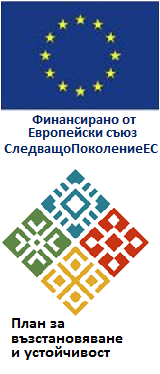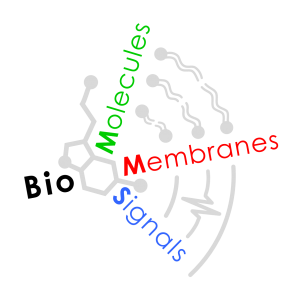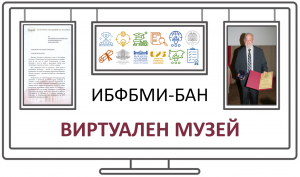Модул „Наука“ | Модул „Кариера“  Проф. Андрас Дер, HUN-REN Biological Research Centre, Institute of Biophysics
What Can We Learn from Heart-rate Variability?
Абстракт (EN)
Проф. Андрас Дер, HUN-REN Biological Research Centre, Institute of Biophysics
What Can We Learn from Heart-rate Variability?
Абстракт (EN)As all biological rhythms, heart rate (HR) carries inherent stochastic features, usually represented by the beat-to-beat variability of interbeat interval (heart rate variability, HRV). HRV has been growingly considered the most important hallmark of heart rate (HR) time series: An elevated HRV is regarded as the sign of high fitness and adaptability of the heart, while reduced HRV levels are usually associated with various pathological conditions. During the past decades, an overwhelming amount of HRV data has been piled up in the research community, but the individual results are difficult to reconcile due to the different measuring conditions and the usually HR-dependent statistical HRV-parameters applied. Moreover, the precise HR-dependence of HRV parameters is not known. Using data gathered by a wearable sensor of combined heart-rate and actigraphy modalities, we have recently introduced a novel descriptor of HRV, based on a modified Poincaré plot of 24-h ECG-recordings. Our evaluation procedure applied on the time series of interbeat intervals allows the description of the HRV(HR) function with unprecedented precision. The new method is suggested to be used as a competent tool in future HRV analyses for both clinical and training applications, as well as for everyday health promotion.
Автобиография (EN)András Dér received his M.Sc. degree in physics from József Attila University, Szeged, Hungary, in 1980, and the Ph.D and D.Sc. degrees from the Hungarian Academy of Sciences, in 1988 and 1999, respectively. He had been the Deputy Director of the BRC, Institute of Biophysics; the Co-President of the Biophysics Committee of the Hungarian Academy of Sciences, Szeged; and the Vice President of the Hungarian Biophysical Society for more than a decade. He is currently a Scientific Adviser at the HUN-REN Biological Research Centre, Institute of Biophysics. Together with his colleagues, he is named as an inventor on several granted and pending patents about lab-on-a-chip applications in bioelectronics and medicine. His major research interests include protein dynamics, biophotonics, and bioelectronics.
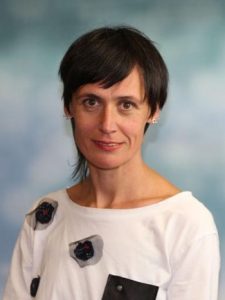 Проф. Маргарита Стайкова, Durham University
Проф. Маргарита Стайкова, Durham University
Lipid Membranes Under Physical Confinement
Абстракт (EN)I will cover ongoing research in our lab on the behaviour of lipid membranes under physical forces. The goal of our experiments is on one hand to explain biophysical processes observed in cells, and on another to use artificial lipid systems to create biohybrid entities with life-like properties. I will summarise ongoing projects on 1) the biophysics of membrane area regulation in cells, 2) the transformation of cell-cell contacts under hydraulic fracturing, and 3) on how some bacteria can morph lipid vesicles into active swimmers.
Автобиография (EN)Margarita Staykova is Professor in Soft Matter and Biological Physics at the Physics Department in Durham University, UK. She obtained her MSc in Molecular Biology and Biophysics from University of Sofia in 2000, did her PhD in Biophysics at Rostock University, Germany (2006), and later worked as a postdoc at the Max Planck Institute of Colloids and Interfaces, Germany (2007-2009) and at the Department of Mechanical Engineering at Princeton University, USA (2009-2013). In 2013 she joined Durham University, where she leads an experimental research group in membrane biophysics. She is the Director of Science of the Institute of Advanced Studies at Durham University, and sits on the steering committee of the Institute of Physics, Biological Physics group, UK.
 Доц. д-р Атанас Курутос, Институт по органична химия с Център по фитохимия, БАН
Доц. д-р Атанас Курутос, Институт по органична химия с Център по фитохимия, БАН
Biocompatible Fluorescent Probes Emitting in the Visible, Near-Infrared Region, and Beyond: From Small Molecules to Supramolecular Assemblies
Абстракт (EN)
Автобиография (EN)Atanas Kurutos obtained his BSc degree in chemistry from Kingston University (London – UK) in 2010, followed by an MSc degree in organic chemistry from Sofia University “St. Kliment Ohridski” – Faculty of Chemistry in 2013. In the frame of 24 months, he obtained his PhD degree in 2016 from Sofia University “St. Kliment Ohridski” – Faculty of Chemistry. Dr. Kurutos spent significant time as a post-doctoral fellow at Rudjer Boskovic Institute (Zagreb – Croatia), University of Fribourg (Fribourg – Switzerland), Roskilde University (Roskilde – Denmark), University of Copenhagen (Copenhagen – Denmark), and a 2-year JSPS fellowship in Keio University (Tokyo – Japan). Currently, he is appointed as an associate professor at the Institute of Organic Chemistry with Centre of Phytochemistry – Bulgarian Academy of Sciences. His main research interests cover organic synthesis, chemistry of heterocyclic compounds, design of functional colourimetric chemo- and biosensors, and spectroscopy (UV-Vis, Fluorescence, circular dichroism, NMR, IR). Additional subfields include the investigation of photophysical properties of organic molecules and complexes, determination of interactions with biomacromolecules, solvatochromism, functional materials, Theranostics etc. Dr. Kurutos is a co-author of 50 scientific papers, published over the past 7 years. At the moment he is serving as a guest editor for journals like Molecules (MDPI) and Frontiers in Coatings, Dyes and Interface Engineering (Frontiers).
 Проф. Анелия Хорват, George Washington University
Проф. Анелия Хорват, George Washington University
Identification and Analysis of Cell-specific Expressed Genetic Variants from scRNA-seq Data
Абстракт (EN) I will describe a computational framework for identifying and analyzing Single Cell-specific Expressed Single Nucleotide Variants (sceSNVs) from single-cell RNA-sequencing (scRNA-seq) data. Our team is developing this framework to address challenges posed by low-frequency cellular events, such as somatic mutations, which can be present in very few or even a single cell. These variants may indicate pre- or early-somatic clonality in cancer and normal tissues or cell-specific RNA variability.
Currently, most genetic variation is analyzed from bulk sequencing datasets, where sensitivity is often insufficient to detect variants in a low number of cells. Our computational framework is built around a new tool called SCExecute, enabling the execution of various software designed for bulk sequencing data on barcode-stratified, extracted single-cell alignments in real-time. Using SCExecute and tools for bulk sequencing data analysis, we conducted a groundbreaking exploration of cell-level expressed genetic variation across 28 publicly available cancer and normal datasets, including prostate cancer, non-small cell lung carcinoma, cholangiocarcinoma, neuroblastoma, normal fetal adrenal, and normal embryo.
This analysis uncovered over 100,000 previously unreported SNVs, with more than 70% of them unidentifiable using other methods. Approximately 10% of these novel sceSNVs exhibit preferential expression in specific cell clusters and pseudo-time stages. Furthermore, differential gene expression analysis comparing cells expressing only the reference nucleotide revealed the deregulation of functional gene networks related to the SNV-harboring gene in cells expressing the sceSNV. These findings suggest the existence of an unappreciated repertoire of cell-level expressed nucleotide variation, frequently recurring and common across samples, actively participating in transcriptome function and dynamics.
The presence of these variants and their associations with specific gene sets and cell types suggest novel mechanisms and functions for expressed genetic variation, including potential implications in cancer progression and cell fate determination.
Anelia Horvath holds a Bachelor’s and Master’s Degree in Molecular Biology and Genetics from Sofia University, Bulgaria, and completed her PhD training in Genomics at the Medical University of Sofia. She further pursued postdoctoral training in Cancer Genomics at NICHD, NIH, Bethesda, MD, USA. During her postdoctoral tenure, Dr. Horvath led efforts to identify new genes associated with endocrine tumors.
In September 2013, Dr. Horvath joined George Washington University (GWU) as the Director of the McCormick Genomic and Proteomic Center (MGPC) within the School of Medicine and Health Sciences. In this role, she focused on developing innovative methods for analyzing and integrating genomics and transcriptomics data. As a Professor in the Department of Biochemistry and Molecular Medicine at GWU and Director of MGPC, Dr. Horvath has accumulated over a decade of experience in leading next-generation sequencing (NGS) analyses and custom bioinformatics approach development.
Her research projects at the intersection of bioinformatics, computational biology, and genomics address health and disease. Over the past three years, her primary research focus has been the analysis of expressed genetic variants from single-cell RNA-sequencing (scRNA-seq) data, leading the development of several analytical software tools.
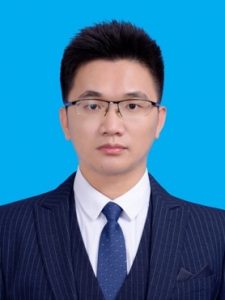 Д-р Йен Йен, Institute of Biomedical and Healthcare Engineering at Shenzhen Institutes of Advanced Technology, Chinese Academy of Sciences
Д-р Йен Йен, Institute of Biomedical and Healthcare Engineering at Shenzhen Institutes of Advanced Technology, Chinese Academy of Sciences
Topological Signal Processing – A Shape Description-based Approach for Human State Investigation in Biomedical Engineering
Абстракт (EN)I will cover the ongoing research in our lab on topological data analysis for pattern analysis in biomedical signal processing and pattern analysis applications. The goal of our investigations is, on the one hand, to seek better biomarkers in multi-modality human information in different biomedical engineering applications and, on another to develop artificial intelligence systems by incorporating topological features. I will show that the topological approach will bring novel descriptions compared to traditional representations by introducing typical body-sensing signals applications in human state recognition tasks, such as the EEG-based mental workload recognition/emotion recognition, ECG-based OSA detection, wearable IMU signal based activity recognition and gait identification, etc.
Автобиография (EN)Dr. Yan Yan, Ph.D., is an Assistant Research Fellow at the Institute of Biomedical and Healthcare Engineering at Shenzhen Institutes of Advanced Technology, Chinese Academy of Sciences, China. He obtained his bachelor’s and master’s degree in Instrumentation and Measure Science from the Harbin Institute of Technology, did his Ph.D. in Computer Science at the University of Chinese Academy of Sciences, and later worked as an assistant researcher at the Institute of Biomedical and Healthcare Engineering at Shenzhen Institutes of Advanced Technology, Chinese Academy of Sciences. He leads a research group in artificial intelligence in medicine that focuses on developing novel solutions such as topological data analysis, graph signal processing, and deep learning for biomedical engineering.
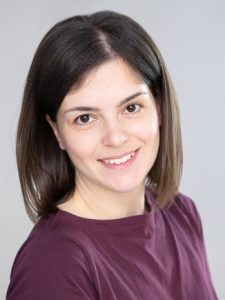 Д-р Милка Докторова, University of Virginia
Д-р Милка Докторова, University of Virginia
Phospholipid and Cholesterol Organization of Cell Plasma Membranes
Абстракт (EN)I will present our recent results on the phospholipid and cholesterol organization of cell plasma membranes. Current models of biomembrane structure and function rest upon the implicit assumption that the membrane leaflets have similar abundances of phospholipids. Using quantitative lipidomics, we discovered that this assumption is generally invalid with cytoplasmic leaflets of human erythrocyte membranes having large overabundance of phospholipids compared to exoplasmic leaflets. This imbalance is enabled by an asymmetric interleaflet distribution of cholesterol and produces unique functional characteristics. I will discuss these findings and show how they relate to membrane permeability, leaflet tension and protein localization.
Автобиография (EN)Milka Doktorova is a postdoctoral researcher in the lab of Ilya Levental at University of Virginia. After graduating from the Mathematics High School in Varna in 2006, she moved to the USA where she received a B.A. degree in Computer Science and Mathematics from Mount Holyoke College in 2010 and an M.S. in Computer Science from Dartmouth College in 2012. She conducted her doctoral work in biophysics at Cornell University and Weill Cornell Medical College, and defended her Ph.D in 2018. She is an active member of the Biophysical Society and is currently serving as the Treasurer of the Membrane Structure & Function Subgroup.
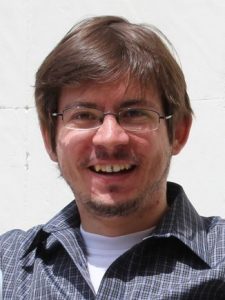 Д-р Радослав Александров, Институт по молекулярна биология – БАН
Д-р Радослав Александров, Институт по молекулярна биология – БАН
Alterations in PARP1 dynamics induced by PARP inhibitors in living cells
Абстракт (EN)
Автобиография (EN)Radoslav Aleksandrov obtained his BSc in Molecular Biology and MSc in Biochemistry from the Faculty of Biology of Sofia University. He did his PhD in the Laboratory of Genomic Stability in the Institute of Molecular Biology of the Bulgarian Academy of Sciences, where he is currently a postdoctoral fellow. His doctoral work led to the elucidation of the kinetics of 70 different DNA repair proteins at complex DNA lesions, providing a comprehensive kinetic resource for the study of the DNA damage response. Currently, Dr. Aleksandrov focuses his research on the use of live-cell imaging techniques to uncover the intricate changes in the dynamics and coordination between proteins participating in the repair of complex DNA lesions following treatment with various DNA repair targeting drugs. His main goal is to gain systematic knowledge about the wide-ranging mechanisms of action of those drugs in a bid to develop better mechanism-driven therapeutic solutions for cancer patients.
Модул „Наука“ | Модул „Кариера“ Проф. Ирена Василева, Нов български университет
Academic Integrity in Biosciences: Upholding Ethical Standards in Research and Education
Абстракт (EN)
Проф. Ирена Василева, Нов български университет
Academic Integrity in Biosciences: Upholding Ethical Standards in Research and Education
Абстракт (EN)Academic integrity serves as the bedrock upon which the biosciences community builds its knowledge, trust, and ethical foundation. This presentation delves into the core principles of academic integrity, its pivotal role in bioscience research and education, and the profound consequences of its breach.
We begin by defining academic integrity, emphasizing the importance of honesty, responsibility, and ethical behavior in scholarly pursuits. Various forms of academic misconduct, such as plagiarism, fabrication, cheating, and collusion, are explored, shedding light on the nuances of ethical transgressions.
In the biosciences, where the pursuit of truth and ethical considerations are paramount, maintaining academic integrity becomes even more critical. We discuss the implications of academic misconduct on research, its potential to hinder scientific advancements, and the ethical dilemmas it poses in studies involving humans, animals, and genetic materials. The presentation underscores the far-reaching consequences of academic misconduct, including academic penalties, damage to personal and institutional reputations, legal ramifications, and the erosion of trust within the scientific community.
To mitigate academic misconduct, we explore proactive measures, such as educational initiatives, time management strategies, clear citation guidelines, and the promotion of originality and critical thinking. Furthermore, we delve into the essential aspect of reporting academic misconduct, emphasizing the significance of whistleblowers, anonymous reporting, and the role of faculty and peers.
Building a culture of integrity within biosciences is central to the presentation’s message. We discuss the importance of leading by example, fostering open discussions, creating a supportive learning environment, and recognizing and rewarding ethical behavior as means to promote a robust culture of integrity.
Irena Vassileva is Full professor of English and German, Dr. habil., at the New Bulgarian University, Sofia, and has worked extensively on spoken and written academic communication in English, German and Bulgarian. She has published four monographs and a number of articles in international peer-reviewed journals and collections of articles. Vassileva has also received various research awards from outstanding foundations in international competition and has worked at universities in Bulgaria, Germany, and the UK, among them several fellowships from the Alexander von Humboldt Foundation, the Open Society Fund, the Canadian government. At present she is lead researcher of the project “The gravity of academic plagiarism in the perception of scholars, students, and science policy makers in Bulgaria”, financed by the Bulgarian National Science Fund.
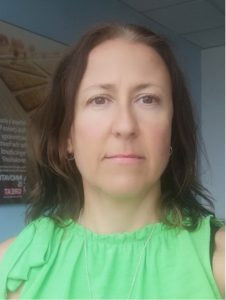 Доц. д-р Емилия Печева, Британско посолство София
Доц. д-р Емилия Печева, Британско посолство София
UK Science and Innovation Network and Opportunities for Science and Higher Education Initiatives with the UK
Автобиография (EN)Dr Emilia Pecheva is a science and innovation officer at the British Embassy in Sofia since July 2018. Together with 30 science officers in Europe and total of 110 in 47 countries in the world Dr Pecheva is part of the UK Science and Innovation Network (SIN). The network belongs to two ministerial departments in the UK: the Foreign, Commonwealth and Development Office and the Department for Science, Innovation and Technology.
Dr Pecheva’s work is to facilitate the development of strategic partnerships and collaborations between the UK and Bulgaria in science and innovation, in topics of mutual interest such as life sciences, climate, energy, renewables, artificial intelligence, cyber, microelectronics. In both countries, Bulgaria and the UK Emilia has a wide range of contacts working in the field of science and innovation at various levels – in governments, universities and science academies, in public research organisations, those funding science, in business and other science-related organisations. Part of her job is to promote the UK science achievements to the Bulgarian scientific/business community and vice versa – to promote the Bulgarian science achievements to English partners, in order to support and stimulate the bilateral relations.
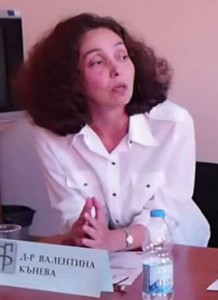 Доц. д-р Валентина Кънева, СУ „Св. Климент Охридски“
Доц. д-р Валентина Кънева, СУ „Св. Климент Охридски“
Eтика в научното изследване. Насърчаване на добри практики в научните изследвания
Абстракт (EN)For many reasons we talk about ethics in scientific research today and emphasize the wider responsibilities of scientists in research and in society. We are all aware of the growing role of science in contemporary societies and the potential of newly developed technologies to improve our life but also to inflict harm to human beings, nonhuman beings, or to environment. Furthermore, we expect from scientists to be able to reflect on the ethical problems or dilemmas which they meet in their research practices. Scientific practices use different methodologies but as research practices and as communal practices they all require ethical principles to be followed in order the aims of research to be achieved.
In my presentation I will discuss the following: how to promote responsible conduct of research through training and education, mentoring, developing an institutional culture of integrity, and clear procedures for dealing with misconduct; further, the role of the established procedures for ethical self-assessment and review of research protocols; and finally, specific problems that concern the ethics of biomedical research.
Автобиография (EN)Valentina Kaneva is Associate Professor of Philosophy and Ethics at St. Kliment Ohridski University of Sofia. She obtained her MA degree in Philosophy and her PhD in Philosophy and Ethics from Sofia University. Valentina Kaneva is founder and director of the Graduate Program “Integrative Bioethics” at the Faculty of Philosophy. She has successfully completed the two-year certificate Fogarty International Program in Research Ethics of the U.S. National Institute of Health, organized by the Icahn School of Medicine at Mount Sinai (New York) in partnership with the University of Belgrade School of Medicine. She teaches courses on philosophical ethics, medical ethics and bioethics, research ethics. Since 2016 Valentina Kaneva is Chairperson of the Ethics Commission of Sofia University “St. Kliment Ohridski”.
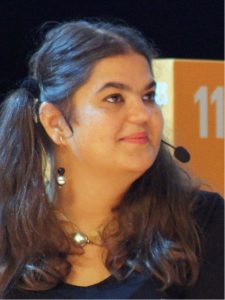 Доц. д-р Вася Атанасова, Институт по биофизика и биомедицинско инженерство – БАН
Доц. д-р Вася Атанасова, Институт по биофизика и биомедицинско инженерство – БАН
От стрес към прогрес: Отговаряне на критични научни рецензии
Абстракт (EN)Responding to critical or negative peer reviews is a serious source of anxiety, especially to young researchers and first timers. As stressful as it may be, this is an integral, inherent and unavoidable part of the process of quality scientific publishing. Unsurprisingly, many people tend to react adversely when their work is being scrutinized and would respond to critical peer reviews with sarcasm and aggression, thus risking not only their manuscript’s chances of being published, but also their personal—and institutional—reputation. Very often they might be even unaware of the measure of potential damages that an impulsively written spiteful response to reviewers may lead to, in either the short or the long run.
The good news is that responding to critical and negative peer reviews is something one can learn. Regardless of the specific circumstances related to the particular manuscript, authors team, publication venue or the essence of the critical remarks, there are some useful tips and recipes how to perceive—and respond to—criticism gracefully, thus improving the chances of the manuscript being accepted, or, at the very least, keeping the author’s face in that difficult situation.
“From Stress to Progress” is Vassia’s ongoing attempt for a set of academic onboarding lectures that aim to share experience and learning patterns related to conflict resolution in academic context. The first lecture from the series was devoted to the issues of plagiarism, self-plagiarism and antiplagiarism software.
Vassia Atanassova completed a bachelor degree in informatics in Sofia University and a master degree in marketing in UNWE. She defended her PhD in informatics in the Institute of Information and Communication Technologies at the BAS, and as of 2014 has been working in Institute of Biophysics and Biomedical Engineering, being Associate Professor as of 2018. Her research interests include intuitionistic fuzzy sets, decision making under uncertainty, intercriteria analysis, data analysis. She is member of the Editorial Board of the MDPI Journal “Mathematics” in “Fuzzy Sets, Systems and Decision Making” Section, and technical editor of the international journals “Notes on Intuitionistic Fuzzy Sets” and “Notes on Number Theory and Discrete Mathematics”. In addition, she is passionate promoter of open knowledge sharing and transfer from academy to society by means of the free encyclopedia Wikipedia and other open source technologies.
 Проф. Андрас Дер, HUN-REN Biological Research Centre, Institute of Biophysics
Проф. Андрас Дер, HUN-REN Biological Research Centre, Institute of Biophysics Проф. Маргарита Стайкова, Durham University
Проф. Маргарита Стайкова, Durham University  Доц. д-р Атанас Курутос, Институт по органична химия с Център по фитохимия, БАН
Доц. д-р Атанас Курутос, Институт по органична химия с Център по фитохимия, БАН Loading...
Loading...
 Проф. Анелия Хорват, George Washington University
Проф. Анелия Хорват, George Washington University Д-р Йен Йен, Institute of Biomedical and Healthcare Engineering at Shenzhen Institutes of Advanced Technology, Chinese Academy of Sciences
Д-р Йен Йен, Institute of Biomedical and Healthcare Engineering at Shenzhen Institutes of Advanced Technology, Chinese Academy of Sciences Д-р Милка Докторова, University of Virginia
Д-р Милка Докторова, University of Virginia  Д-р Радослав Александров, Институт по молекулярна биология – БАН
Д-р Радослав Александров, Институт по молекулярна биология – БАН Loading...
Loading...
 Проф. Ирена Василева, Нов български университет
Проф. Ирена Василева, Нов български университет Доц. д-р Емилия Печева, Британско посолство София
Доц. д-р Емилия Печева, Британско посолство София Доц. д-р Валентина Кънева, СУ „Св. Климент Охридски“
Доц. д-р Валентина Кънева, СУ „Св. Климент Охридски“ Доц. д-р Вася Атанасова, Институт по биофизика и биомедицинско инженерство – БАН
Доц. д-р Вася Атанасова, Институт по биофизика и биомедицинско инженерство – БАН

